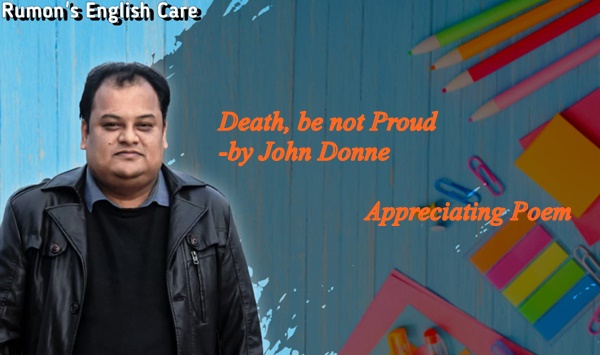Death, be not Proud
Death, be not Proud
-by John Donne
Death, be not proud, though some have called thee
Mighty and dreadful, for thou art not so;
For those whom thou think’st thou dost overthrow
Die not, poor Death, nor yet canst thou kill me.
From rest and sleep, which but thy pictures be,
Much pleasure; then from thee much more must flow,
And soonest our best men with thee do go,
Rest of their bones, and soul’s delivery.
Thou art slave to fate, chance, kings, and desperate men,
And dost with poison, war, and sickness dwell,
And poppy or charms can make us sleep as well
And better than thy stroke; why swell’st thou then?
One short sleep past, we wake eternally
And death shall be no more; Death, thou shalt die.
Bengali Translation:
মৃত্যু তুমি দেমাগী সেজো না, যদিও অনেকে তোমাকেই বলে
শক্তিমত্ত এবং ভয়ঙ্কর, যেহেতু, তা নও নিজেই তুমি তা জানো,
কেননা, যাদের, দলিত করেছো ভাবো, পারো না তো, আজ মানো,
মরি না আমি, বন্ধ্যা মৃত্যু, মারতে পারো না, আমাকে কোনই ছলে।
বিশ্রাম আর ঘুম বৈ নয়, যাকে তুমি মানো তোমার স্বরূপ ব’লে
বড় শান্তির, তারপর উঠে, সমধিক তেজে বয়ে চলা, দাবড়ানো,
আমাদের মাঝে সেরা জন যারা, তৈরি তো, ওই দ্যাখো দাঁড়ানো,
অস্থিগুলোকে তোমার কাছেই বিশ্রামে রেখে, আত্মারা যাবে চলে।
রাজদণ্ড, নিয়তি, দৈব, আততায়ীদের সেবাদাস, তুমি দাস,
তুমি বাস করো যুদ্ধের সাথে, অসুখে ও বিষে, বড়জোড় অনাহারে,
ঘুম এনে দিতে জাদুটোনা আর আফিম নেশাও পারে,
তোমার চেয়েও উত্তম সেটা; কেন এ-দেমাগ, কেন তবে উল্লাস?
মুহূর্তকাল-নিদ্রা শেষে, চিরায়তে মেশা, তবে তুমি ধ্যান করো,
তুমি তো তখন থাকবে না আর; মৃত্যু, তুমিও তো মরো।
Answer the following questions. 1×5=5
a) How do some people evaluate death? And why?
b) Why does the poet tell death not to be proud?
c) Who die soonest and why?
d) How does the poet demean or humiliate death?
e) “One short sleepe past, wee wake eternally”- What does this line signify?
Answer:
(a) Some people evaluate death to be mighty and dreadful. They having little knowledge about life and life hereafter, prioritize worldly life greatly. So, they fear death.
(b) The poet opines that death actually cannot kill anyone. Death transfers as he thinks, us from worldly life to eternal heavenly life when we can enjoy great pleasure. So, he forbids death to be falsely proud.
(c) Those who are the best and virtuous men and women die soonest. Because, they are ordained by fate to get rid of worldly sufferings and to enjoy eternal rest and heavenly pleasure through their death.
(d) The poet calls death the slave of fate, chance, activities of wicked men, poison, war and sickness. Even, he considers death inferior to opium or other drugs that give a better and gentle sleep. Thus, the poet demeans or humiliates death.
(e) By this line, the poet means that through death or a short sleep in the grave, we get an eternal life when death dies itself and we enjoy eternal heavenly pleasure.
Summary:
Overall, John Donne’s poem ‘Death Be Not Proud’ is a masterful argument against the power of Death. The theme, or the message, of the poem is that Death is not some all-powerful being that humans should fear. Instead, Death is actually a slave to the human race and has no power over our souls.

